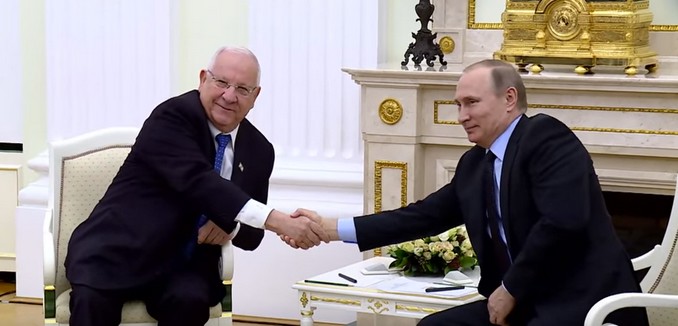During an official visit to Moscow on Wednesday, Israeli President Reuven Rivlin told Russian President Vladimir Putin that any future agreement on Syria must not strengthen Iran and Hezbollah. According to a Haaretz reporter, Rivlin also said that Israel considers Iranian and Hezbollah outposts on the Israeli-Syrian border to be a red line.
“We want Iran and Hezbollah not to emerge strengthened from this entire process,” Rivlin stressed before his meeting with the Russian premier. “Everybody agrees that the Islamic State organization is a danger to the entire world, but Shiite Iranian fundamentalist Islam is for us just as dangerous.”
Dore Gold, the director-general of Israel’s foreign ministry, added on Wednesday that “when some kind of modus vivendi is reached inside of Syria, it is critical from the Israeli standpoint that Syria does not emerge as an Iranian satellite incorporated fully into the Iranian strategic system,”
Michael Oren, a member of Knesset and former Israeli ambassador to the United States, explained further, “If we have to choose between ISIS and Assad, we’ll take ISIS. ISIS has flatbed trucks and machine guns. Assad represents the strategic arch from Tehran to Beirut, 130,000 rockets in the hands of Hezbollah, and the Iranian nuclear program.”
Israeli Defense Minister Moshe Ya’alon similarly stated during his recent visit to Washington that “to allow Iran now to dominate Syria” would be a “mistake.”
In the last couple of years, all ten of the attacks perpetrated against Israel from Syrian soil were directed by the Islamic Revolutionary Guard Corps and its proxies from territory governed by Syrian armed forces, rather than opposition-governed territory, according to Ya’alon. Islamic Jihad, a terrorist group financed and armed by Iran, launched rockets into northern Israel from Syria last August. Israel has in the past acted to prevent the IRGC from establishing terror infrastructure along the Golan Heights, killing Jihad Mugniyeh, a Hezbollah commander responsible for operations against Israel from Syria. The State Department sanctioned Samir Kuntar, a terrorist with links to the IRGC, last September for his role “in building up Hizballah’s terrorist infrastructure in the Golan Heights.” He was killed a couple months later in what is believed to be an Israeli strike.
Jerusalem has refrained from taking sides in the five-year long Syrian civil war. However, the IDF has interfered to halt the transfer of advanced weapons from Syria to Hezbollah in Lebanon that could alter the balance of power. Israeli officials believe a victory for Bashar al-Assad’s regime would be a victory for Tehran. Ya’alon expressed concern that Iran is exploiting the international legitimacy and financial windfall it gained from the nuclear deal to continue pressing for regional hegemony in Syria, Lebanon, Iraq, and Yemen. He warned against misperceiving Iran “as a central player in solving or settling, or bringing about stability to the region.”
According to a Haaretz reporter, Rivlin indicated that Israel would like Russia’s assistance in returning UN monitors to the Syrian-Israeli border on the Golan as part of a Syrian ceasefire deal, arguing that the peacekeepers’ presence could help stabilize the border area.
[Photo: iGlobali News / YouTube ]




